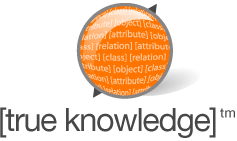104 results for semantic web technologies
This entry is a response to I will never support the Semantic Web by Brian of d'bug.
I'm getting tired of reading about how the Semantic Web is some kind of pipe dream that will never be realized. The Semantic Web is completely and entirely within our technological reach. People may have been given the impression that we cannot create the Semantic Web because of its complexity, the number of years it has been in development, or even the unanswered questions that still exist for certain problems we will face. These are valid reasons to doubt our progress, but progress is certainly what we are making.
Continue reading Some People Will Never Support the Semantic Web
Microsoft has taken steps in the direction of supporting Semantic Web standards such as RDF, OWL, and SPARQL. While their support is minimal and not hyped very broadly it is still nice to see the them implementing these standards in their software. I also haven't seen any evidence that they wish to formulate a proprietary brand of these standards, so I have no complaints.
Continue reading How Microsoft Invests in Semantic Web Technologies
 The World Wide Web has long been evolving towards the vision of the Semantic Web — an extension of the existing web through which machines are better able to interoperate and work on our behalf. It promises to infuse the Internet with a combination of metadata, structure, and various technologies so that machines can derive meaning from information, make more intelligent choices, and complete tasks with reduced human intervention. It is a dramatic vision that stands to transform the existing Web in devastatingly powerful ways.
The World Wide Web has long been evolving towards the vision of the Semantic Web — an extension of the existing web through which machines are better able to interoperate and work on our behalf. It promises to infuse the Internet with a combination of metadata, structure, and various technologies so that machines can derive meaning from information, make more intelligent choices, and complete tasks with reduced human intervention. It is a dramatic vision that stands to transform the existing Web in devastatingly powerful ways.
Continue reading Introduction to the Semantic Web Vision and Technologies - Part 1 - Overview
 Before I started researching the Semantic Web I spent a few years as a hobbyist game developer. In fact, if you'd asked me 4 years ago what I'd be doing today I would have said "working on a game engine." I still enjoy game development and (naturally) playing video games as well. I often wonder how the Semantic Web will affect game development, and how games may take advantage of Semantic Web technologies. I've searched high and low (on Google) and haven't found a single written piece on people's ideas of the Semantic Web and video games so I will describe my own, as well as provide some visuals to give you a clear picture.
Before I started researching the Semantic Web I spent a few years as a hobbyist game developer. In fact, if you'd asked me 4 years ago what I'd be doing today I would have said "working on a game engine." I still enjoy game development and (naturally) playing video games as well. I often wonder how the Semantic Web will affect game development, and how games may take advantage of Semantic Web technologies. I've searched high and low (on Google) and haven't found a single written piece on people's ideas of the Semantic Web and video games so I will describe my own, as well as provide some visuals to give you a clear picture.
Continue reading Possibilities for Video Games and the Semantic Web
 In Part 2 of this series we reviewed Unicode, URI, and XML - three foundational technologies that permeate the existing Web and that are especially relevant to the emerging Semantic Web. We will put all three to use as we take our next step up the Semantic Web layer cake in a review of the Resource Description Framework (RDF). At the same time, we will be taking the visual RDF/OWL editor, Altova SemanticWorks, for a test drive. Since I will be using this tool for the very first time, you can expect an honest review that is rich with screenshots. If you do not already have the software, you may wish to download the trial version now so you can follow along.
In Part 2 of this series we reviewed Unicode, URI, and XML - three foundational technologies that permeate the existing Web and that are especially relevant to the emerging Semantic Web. We will put all three to use as we take our next step up the Semantic Web layer cake in a review of the Resource Description Framework (RDF). At the same time, we will be taking the visual RDF/OWL editor, Altova SemanticWorks, for a test drive. Since I will be using this tool for the very first time, you can expect an honest review that is rich with screenshots. If you do not already have the software, you may wish to download the trial version now so you can follow along.
Continue reading Introduction to the Semantic Web Vision and Technologies - Part 3 - The Resource Description Framework
A lot of you emailed me asking where to find more videos, so I'm delivering the goods. I've expanded the previous list from a paltry 17 to a remarkable 302, and I've included podcasts this time! There were so many videos I had to break them up into different categories for easier skimming. There are no duplicates, however I did place some videos into more than one category when I felt it was appropriate. This list is monstrous, enjoy.
Continue reading 302 Semantic Web Videos and Podcasts!
 True Knowledge is a natural language search engine and question answering site, but to leave it at that would not do the site justice. What makes it stand out from similar sounding services like Powerset and Freebase? True Knowledge tackles natural language search and question answering (much like Powerset and Hakia), and it also maintains a knowledge base of facts about the world (similar to DBpedia and Freebase). However, what makes True Knowledge stand out is that they've combined these features and encourage their userbase to contribute facts and add new knowledge.
True Knowledge is a natural language search engine and question answering site, but to leave it at that would not do the site justice. What makes it stand out from similar sounding services like Powerset and Freebase? True Knowledge tackles natural language search and question answering (much like Powerset and Hakia), and it also maintains a knowledge base of facts about the world (similar to DBpedia and Freebase). However, what makes True Knowledge stand out is that they've combined these features and encourage their userbase to contribute facts and add new knowledge.
Continue reading True Knowledge: The Natural Language Question Answering Wikipedia for Facts
I like to consider myself fair and balanced when speaking about most topics. To educate the uneducated and to balance things out a bit I have compiled a list of 5 problems we will likely run into when we reach the Semantic Web. Each problem is a side-effect of advances in technology, rushes to fill new niches, or the previous two plus the desire to make a quick dollar.
Continue reading 5 Problems of the Semantic Web
For just about every area of research there exists documents online describing background information or techniques to accomplish a task in that domain of research. These documents are often referred to as white papers, provided their content is of technical or research orientation. The information held within white papers is essentially accessible by humans only because machines are not able to read and comprehend text in the same way humans can. If machines were able to read white papers and extract information in the same way humans can we would be able to store each fact and piece of knowledge from the documents. This method of indexing would facilitate much more detailed searches, allowing users to search by topic, theory, conclusion, methods, citations, references, etc.
Continue reading Extracting Information from White Paper Text
The most pertinent issue surrounding the Semantic Web is why it has not yet gained strong traction from the development community. First, when I say grassroots I'm referring to the initiative of people like you and I to create the Semantic Web from the bottom-up. The ivory towers is the W3C and their initiative to create the Semantic Web. Both groups are pivotal to the acceptance and adoption of new standards and technologies. Without grassroots initiatives we would not have adoption and without the W3C we would not have standards (which we all have learned the Web most certainly requires).
Continue reading Moving Towards the Semantic Web: Grassroots vs. Ivory Towers
Recent searches
semantic, semantic web search, microsoft semantic web, semantic web blog, semantic focus, semantic web search engine, semantic web problems, semantic cms, semantic web search engines, semantic web, semantic web blogs, camp semantic, semantic web layer cake, natural language processing blog, semantic web microsoft, sparql php, semantic blog, natural language search, true knowledge, eswc 2009, object oriented web, protege tutorial video, rdf tags, introduction to semantic web, php sparql, microsoft rdf, microformats rdf, semantic web conference 2008, owl semantic web, problems with semantic web, rdf vs microformats, cody burleson, protege tutorial, rdf search engine, microformats vs rdf, rdf microformats, semantic web tutorial, semantic web conference 2009, rdf blog, eswc 2008, graphd, rdf microformat, semantic web rdf, blog semantic web, semantic web conference, european semantic web conference 2009, dbpedia freebase, web service life cycle, semanticfocus, python sparql, problems in semantic web, swoogle, curse of knowledge, semantic web introduction, semantic web issues, statistical search, semantic web layers, semantic web vision, twine blog, semantic web podcasts, owl videos, rdf tagging, semantic web natural language processing, arc rdf, falcons search engine, protege 4 tutorial, web videos, european semantic web conference 2008, semantic search engine, semantic web community, semantic web tutorials, semantic natural language processing, semantic web problem, semantic web videos, microformat rdf, natural language processing semantic web, web search engines, open calais, problems with the semantic web, rdf tag, semantic web cake, web thread, tower of babel, bin laden, rdf microsoft, semantic web technology stack, natural language processing blogs, natural language question answering, rdf owl, protege screencast, semantic web logo, problems of semantic web, information extraction blog, microformat vs rdf, protege video tutorial, domain knowledge, james simmons, seesaw effect, semantic search, semantic web references, the curse of knowledge, web 3.0 ideas, web semantic, blog semantic, cms tags, question answering, semantic web games, semantic web technology, aditya thatte, rdf video, spanish semantics, web evolution, data storage in oracle, different from, freebase rdf, microsoft and semantic web, problems semantic web, rdf vs microformat, web search engine, what is true knowledge, freebase dbpedia, jamie lewis blog, question answering wikipedia, semantics, web service ontology, zitgist, freebase linked data, introduction to semantic web vision and technologies, ontology blog, owl introduction, protege semantic, selfishness, semantic update, semantic web protege, focus semantics, freebase vs dbpedia, microformats and rdf, microformats vs, microformats vs semantic web, owl tags, protege semantic web, search engine semantic web, semantic web owl, altova tutorial, backlinks blog, calais initiative, eswc 2008 semantic, protege, semantic web microformats, semantic web research topics, semantic web technologies, arc semantic, natural language semantic web, oracle semantic web, owl semantic, problem with semantic web, rdf, semantic web layer, semantic web tags, service ontology, sparql python, vertical search engines, web blogs, blog rdf, cms semantic, dbpedia vs freebase, hyperdata, natural language processing semantics, ping the semantic web, python semantic web, rdf and microformats, semantic search engines, semantic search example, semantic web services, web object oriented, wikipedia question, wordpress semantic web, information extraction, international semantic web conference 2009, list of vertical search engines, microformats, microformats versus rdf, natural language processing, natural language processing wikipedia, object oriented web page, semantic conference 2008, semantic conference 2009, semantic web conferences 2008, semantic web conferences 2009, semantic web feed, semantic web video, social semantic web, w3c logo, web introductions, webblogs, evolution of semantic web, iri semantic web, issues in semantic web, language question, natural language question answering system, on whose vision is the semantic web concept based, oracle data storage, protege 4.0 tutorial, protege ontology, rdf versus microformats, search engines, search semantic web, semantic data storage, semantic web reference, service, web 3.0 opportunities, web services life cycle, aperture semantic, backlink blog, blog semantics, falcons semantic, hl, introduction of semantic web, leave a comment, legs blog, list of blogs, microsoft semantic web, natural language processing semantic, problem of semantic web, problem semantic web, protege tutorials, rdf blogs, rdf review, semantic web 101, semantic web conferences, semantic web natural language, semantic web podcast, semantic web searches, semantics is, service life cycle, service ontologies, vertical search engines list, web conference 2008, wikipedia natural language processing, arc semantic web, blog natural language processing, european semantic web 2008, foaf search, international semantic web conference, international semantic web conference 2008, introduction to semantic, iswc 2008, life cycle of web services, metadata extraction and tagging service, microformats tags, microsoft sparql, object oriented web pages, owl vs rdf, semantic news aggregator, semantic web 2009, semantic web algorithm, semantic web evolution, semantic web game, semantic web layer cake 2008, semantic web service, semantic web sites, service modeling, spanish semantic, sparql in php, tassilo pellegrini, the nature of selfishness, the semantic web is not a separate web but an extension, tutorial protege, camps semantics, eswc 2008 conference, eswc 2008 semantic web, falcons semantic web search engine, freebase, lowell vizenor, metadata extraction, natural language question, nature of selfishness, object oriented web site, oracle semantic store, owl rdf, pagead2.googlesyndication.com, problems of the semantic web, protege 4, rdf vs. microformats, search engines semantic web, semantic logo, semantic markup tags, semantic web searching, semantic web tools, spanish language semantics, starting a revolution, swoogle.com, tag rdf, the semantic web vision, web service lifecycle, wikipedia question answering, arc php, arc rdf php, blogs semantic web, dbpedia, focus, folktologies, microformats vs. rdf, mining tags, ontology, open calais python, podcast semantic web, problem in semantic web, protege introduction, rdf semantic web, search engine for semantic web, selfishness of mankind, semantic problems, semantic updates, semantic web algorithms, semantic web and search engines, semantic web feeds, semantic web part 4, semantic web vs web 2.0, service lifecycle, stochastic search, storage in oracle, using protege, weaving thread, web 3.0 blog, web technology topics, webservice lifecycle, zeitguiest, blog information extraction, blogs on semantic web, camp semantic, conference semantic web 2008, cross pollination wikipedia, eswc conference 2008, eswc tenerife, ftp p2p, information extraction open source, introduction semantic web

 The World Wide Web has long been evolving towards the vision of the Semantic Web — an extension of the existing web through which machines are better able to interoperate and work on our behalf. It promises to infuse the Internet with a combination of metadata, structure, and various technologies so that machines can derive meaning from information, make more intelligent choices, and complete tasks with reduced human intervention. It is a dramatic vision that stands to transform the existing Web in devastatingly powerful ways.
The World Wide Web has long been evolving towards the vision of the Semantic Web — an extension of the existing web through which machines are better able to interoperate and work on our behalf. It promises to infuse the Internet with a combination of metadata, structure, and various technologies so that machines can derive meaning from information, make more intelligent choices, and complete tasks with reduced human intervention. It is a dramatic vision that stands to transform the existing Web in devastatingly powerful ways. Before I started researching the Semantic Web I spent a few years as a hobbyist game developer. In fact, if you'd asked me 4 years ago what I'd be doing today I would have said "working on a game engine." I still enjoy game development and (naturally) playing video games as well. I often wonder how the Semantic Web will affect game development, and how games may take advantage of Semantic Web technologies. I've searched high and low (on Google) and haven't found a single written piece on people's ideas of the Semantic Web and video games so I will describe my own, as well as provide some visuals to give you a clear picture.
Before I started researching the Semantic Web I spent a few years as a hobbyist game developer. In fact, if you'd asked me 4 years ago what I'd be doing today I would have said "working on a game engine." I still enjoy game development and (naturally) playing video games as well. I often wonder how the Semantic Web will affect game development, and how games may take advantage of Semantic Web technologies. I've searched high and low (on Google) and haven't found a single written piece on people's ideas of the Semantic Web and video games so I will describe my own, as well as provide some visuals to give you a clear picture.
Recently Commented Blog Entries